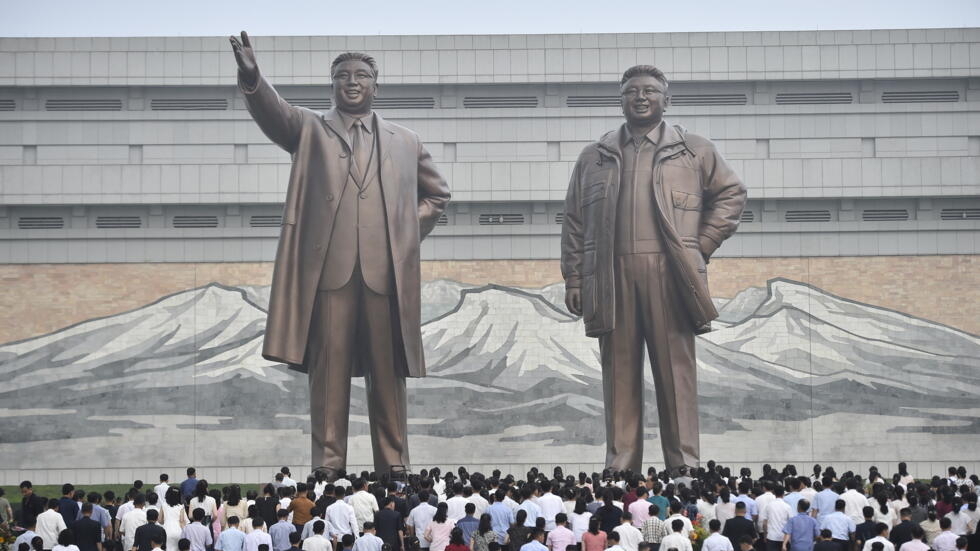Seoul says North Korean nuclear attack would spell 'end' of Kim Jong Un regime
Seoul told North Korea Friday that using its nukes would mean the "end" of Kim Jong Un's regime, after Pyongyang threatened nuclear retaliation over growing US military deployments on the peninsula.
Issued on:

Relations between the two Koreas are at one of their lowest points ever, with the North ramping up weapons testing as Seoul and Washington boost military cooperation.
Pyongyang's defence minister warned Thursday that this week's port visit of a US nuclear-capable submarine to Busan -- the first since 1981 -- could meet the legal threshold for the North to use its nuclear weapons.
North Korea last year adopted a sweeping nuclear law, setting out an array of scenarios -- some of them vague -- in which it could use its nukes, including pre-emptive nuclear strikes if threatened.
As Seoul and Washington have "made clear" before, "any nuclear attack on the alliance will face an immediate, overwhelming and decisive response", Seoul's defence ministry said in a statement Friday.
Were this to happen, "the North Korean regime will face its end", it added.
The US submarine's port visit is a "legitimate defensive response" to Pyongyang's ongoing nuclear threats, it said.
The visit was agreed during South Korean President Yoon Suk Yeol's trip to Washington in April, when he and US President Joe Biden issued a similarly stern warning to Pyongyang about the terminal consequences of using nuclear weapons.
"A nuclear attack by North Korea against the United States or its allies... will result in the end of whatever regime were to take such an action," Biden told reporters at the time.
Announcing his new nuclear law last year, Kim Jong Un said the country's status as a nuclear power was now "irreversible", effectively eliminating the possibility of denuclearisation talks.
The nuclear law is ambiguous, and claims Pyongyang can use its nukes if "an attack by nuclear weapons or other weapons of mass destruction... is judged to draw near".
Analysts have said this could be used to justify the North's possible nuclear use even in the face of conventional attacks.
"North Korea is the only entity that has adopted the Nuclear Forces Policy Act, which includes illegal preemptive strikes," Seoul's defence ministry said Friday.
Pyongyang is also "repeating actual preemptive strike drills and nuclear strike threats against" the Seoul-Washington alliance, it added.
Legal justification
In its now-defunct 2013 nuclear policy law, the North said only that its nuclear weapons could be used to "repel invasion or attack from a hostile nuclear weapons state and make retaliatory strikes".
But the newly adopted law now lists five scenarios in which the North says it can justify using nuclear weapons.
Aside from an attack on the North's leadership or the nuclear command and control system, the scenarios include "an inevitable situation in which it is compelled to correspond with catastrophic crisis to the existence of the state", and "the need for (an) operation for preventing the expansion and protraction of a war".
The latest development shows that Pyongyang is "intending to accumulate justifications for its nuclear response" under its revised doctrine, Yang Moo-jin, president of the University of North Korean Studies in Seoul, told AFP.
The North is making use of the "US nuclear strategic assets being deployed on the Korean Peninsula" to account for their behaviour, he said.
Washington and Seoul held their first Nuclear Consultative Group meeting in the South Korean capital on Tuesday to improve their joint response to any nuclear attack by the North.
South Korea's Friday statement comes as an American soldier, Travis King, is believed to be in North Korean custody after crossing the border during a tourist trip to the Joint Security Area in the Demilitarised Zone on Tuesday.
Pyongyang has a long history of detaining Americans and using them as bargaining chips in bilateral ties. It has not yet issued any comment on King.
(AFP)
Daily newsletterReceive essential international news every morning
Subscribe